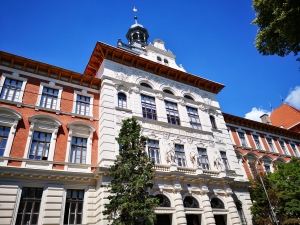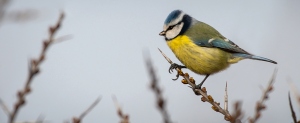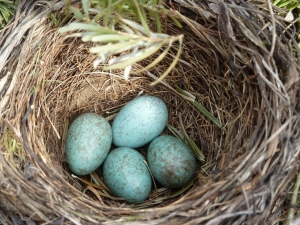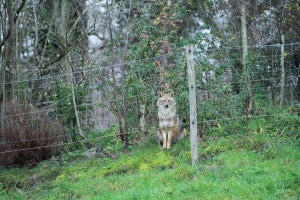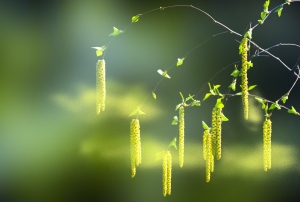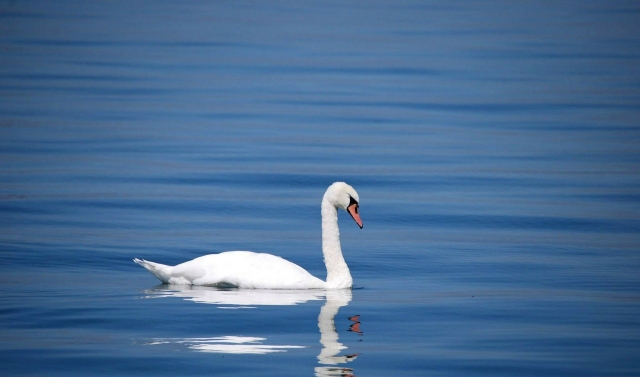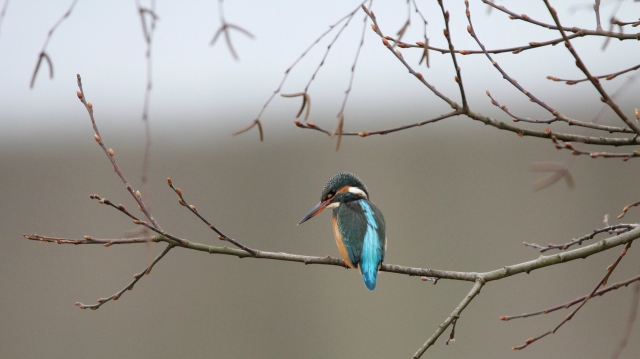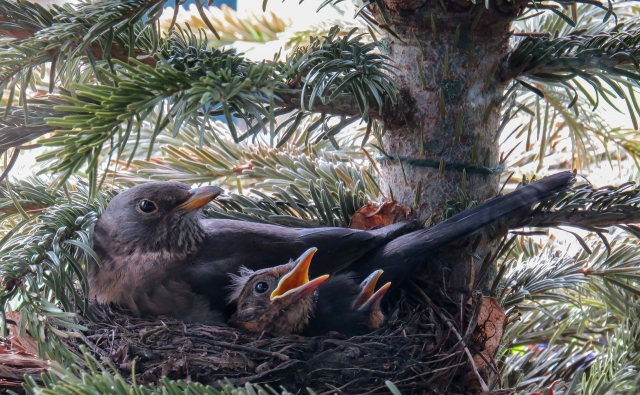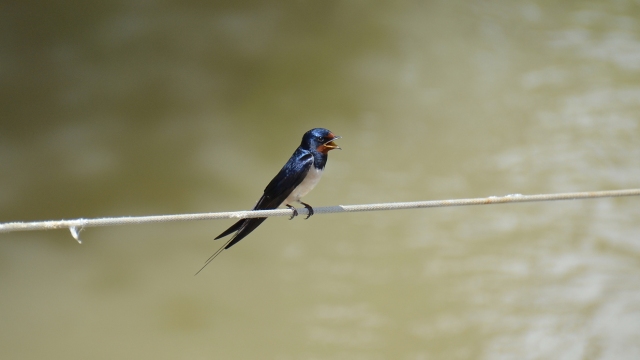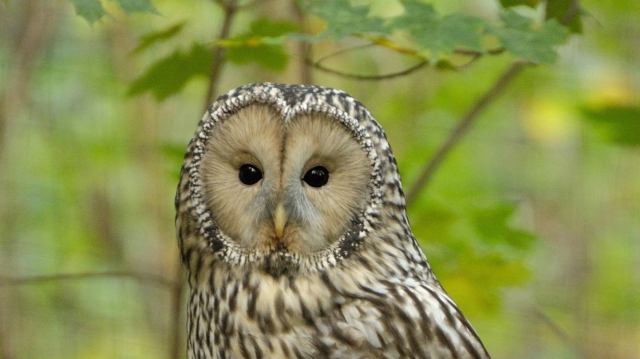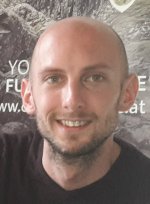
Florian Heigl
BOKU University
BOKU University was founded in Vienna in 1872 and offers a wide range of courses in the natural and life sciences, which is currently used by more than 12,000 students. Through its applied study programmes, BOKU has a long tradition of cooperation with the general public. Thus, one of the university's main focuses is also the communication of new findings to the general public.
In the past, BOKU has carried out numerous Sparkling Science as well as Participatory and Transdisciplinary projects. Since 2013, a working group has been working intensively on Citizen Science, and in 2015 it also held the first Austrian Citizen Science Conference, which is now held annually. This working group is running the platform "Österreich forscht" and founded the Citizen Science Network Austria in 2017 to further strengthen the cooperation between scientific institutions and the general public.
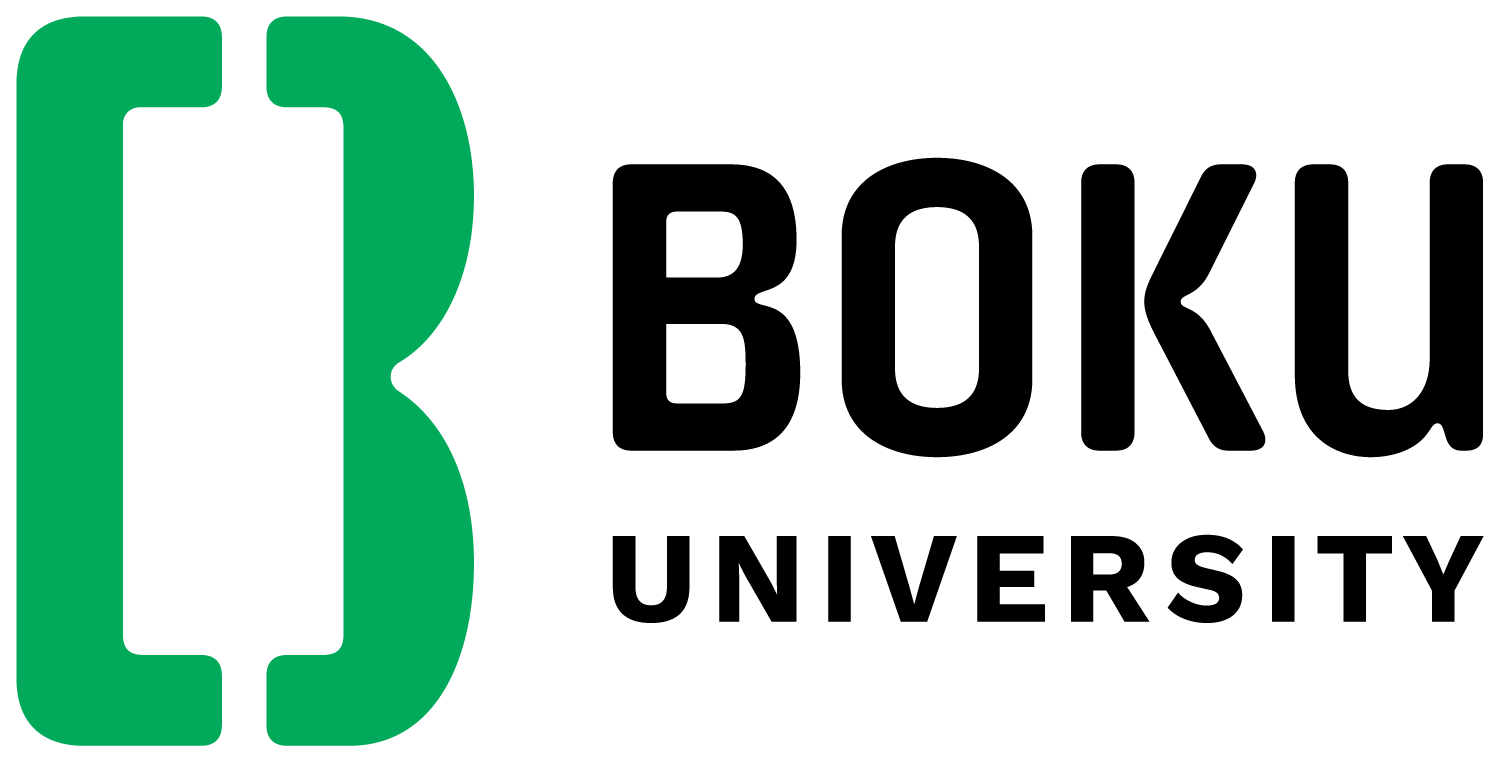
Avian malaria
Reporting and collecting dead songbirds
You find a dead songbird in your garden? Your cat brings home a dead bird? If you are in this situation, you can support a current research project of the University of Veterinary Medicine Vienna.
Avian malaria
Within the framework of the Citizen-Science project "Avian malaria", dead songbirds and woodpeckers from Vienna, Lower Austria, and Burgenland are collected by the Institute of Pathology at the University of Veterinary Medicine Vienna. The birds are examined scientifically to gain further knowledge about the pathological effects of haemosporidian infections in songbirds. Haemosporidians are unicellular blood parasites that are transmitted by mosquitoes and other bloodsucking insects. The researchers are particularly interested in the conditions under which the blood parasites proliferate strongly in the tissues of the birds and thus cause serious and sometimes fatal avian malaria diseases. The collection campaign is carried out in cooperation with StadtWildTiere, Wilde Nachbarn and Birdlife Austria.
Reporting and collecting dead birds
You can report the finding of a dead bird using a report form on the homepage of StadtWildTiere. Besides, you can send a photo of the bird found via e-mail to This email address is being protected from spambots. You need JavaScript enabled to view it.. This makes it easier to check and confirm your report. Nearly all songbird species (except for blackbirds and crows) and woodpeckers are of interest. Information on the safe handling and storage of dead birds can be found on the project homepage.
How do the birds get to the University of Veterinary Medicine Vienna?
Shortly after your report, the project team will contact you (by phone or e-mail) to clarify whether the reported bird is needed and to arrange the pick-up of the dead birds in case of acceptance. To keep the effort for you as low as possible, the pick-up and transportation will be carried out by a transport service (Medlog). The transportation costs will be covered entirely by the Vetmeduni Vienna.
Scientific studies
The dead birds are subjected to pathological examination at the Institute of Pathology of the Vetmeduni Vienna and tested for the presence of haemosporidian parasites. In positive cases, the pathogen species are identified and tissue changes caused by the parasites are analyzed. In any case, the project team will inform you about the results of your finding, and the collected data will be published on the project homepage at the end of the study. All research-related data is stored in the internal patient database of the Vetmeduni Vienna.
The reporting and collecting campaign ran from June to October 2020.
Picture gallery
(Please click on the respective photo to enlarge it)
-
 Collect birds professionally (T Himmel) Collect birds professionally (T Himmel)
Collect birds professionally (T Himmel) Collect birds professionally (T Himmel) -
 Procedure of the Avian Malaria Project (VetMedUni PR) Procedure of the Avian Malaria Project (VetMedUni PR)
Procedure of the Avian Malaria Project (VetMedUni PR) Procedure of the Avian Malaria Project (VetMedUni PR) -
 Bird section (T Himmel) Bird section (T Himmel)
Bird section (T Himmel) Bird section (T Himmel) -
 Plasmodium Meronten (T Himmel) Plasmodium Meronten (T Himmel)
Plasmodium Meronten (T Himmel) Plasmodium Meronten (T Himmel)
https://www.citizen-science.at/en/component/k2/author/934-florianheigl?start=130#sigProId5166146d72
This project fulfilled version 1.1 of the quality criteria for citizen science projects on Österreich forscht.
Breeding bird atlas
The Austrian Breeding Bird Atlas 2013-2018, published in 2024, is the most up-to-date and comprehensive source of information on the occurrence of breeding birds in Austria and changes in their distribution over the last few decades.
What is the Breeding bird atlas?
The breeding bird atlas presents the distribution of all 235 bird species that bred in Austria in the period 2013-2018 on 680 pages and compares these results with the first Austrian breeding bird atlas (1981-1985). During the six field survey years, over 2,300 citizen scientists collected more than 2.1 million data records for this project. Over the following years, the data was checked and analysed - distribution maps, model maps, elevation diagrams and comparative analyses with the first breeding bird atlas were produced. Over 50 authors were involved in the creation of the species texts and over 40 photographers made their images available free of charge. After 30 years, all these contributions have resulted in a new standard work of ornithology.
The project was supported by the Federal Ministry of Agriculture, Forestry, Regions and Water Management and the Federal Ministry for Climate Action as part of the Rural Development Programme 2014-2020.
The Austrian Breeding Bird Atlas 2013-2018 has been published by Verlag Naturhistorisches Museum Wien and can be ordered for EUR 95 at: This email address is being protected from spambots. You need JavaScript enabled to view it..
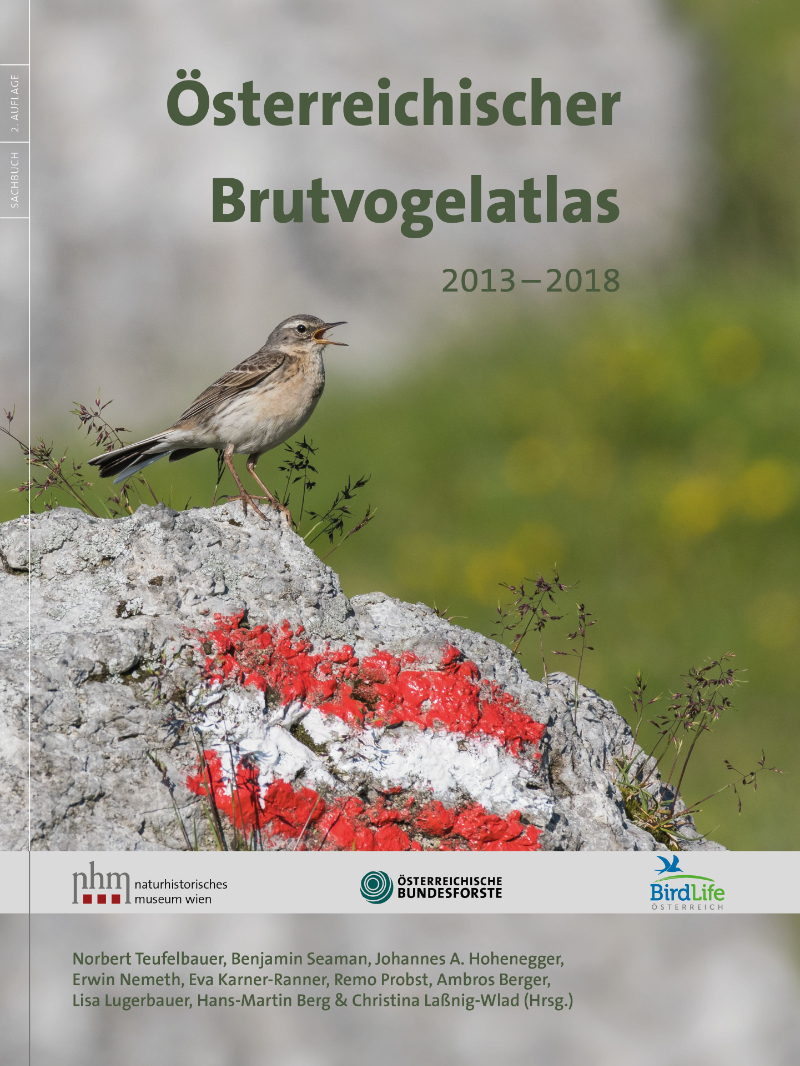
Join in
The project has been completed and participation is unfortunately no longer possible.
Tasks and roles in the project
- Observers: Surveyed the birds according to the specified counting method in their free time.
- Quadrant allocation: Province-specific allocation of open quadrants to the respective observers, targeted addressing of people to close mapping gaps, distribution of mapping documents, first contact point for questions and problems
- Organisation ("Atlas Team"): Organisation of all work steps necessary for mapping, information and training of observers, organisation of methodological workshops for new observers, organisation of atlas conferences in poorly observed areas etc., data verification, carrying out of evaluation and publication
- Planning: Small committee of experts that carried out the basic preparatory work for the counting method - elaboration of different variants, discussion of advantages and disadvantages, etc.
- Methods group: wider panel of experts who discussed the different counting methods and proposed the final method to be used
- Steering group BirdLife: Advice on organisational issues concerning the mapping, especially regarding the regional situation in the individual federal states
- Project steering group: Complete project management
- Project advisory Board: Advisory body, composed of representatives of important stakeholders and with an advisory function for the steering group
Citizen Science Seminar
In 2023, poject coordinator Norbert Teufelbauer held a lecture about the project (in German) as part of the lecture series "Citizen Science Seminar" at the University of Natural Resources and Life Sciences Vienna (BOKU).
-
 Bird watching with binoculars Bird watching with binoculars
Bird watching with binoculars Bird watching with binoculars -
 Professional bird watching Professional bird watching
Professional bird watching Professional bird watching -
 Observation is more fun as a team! Observation is more fun as a team!
Observation is more fun as a team! Observation is more fun as a team!
https://www.citizen-science.at/en/component/k2/author/934-florianheigl?start=130#sigProIde5dbec0461

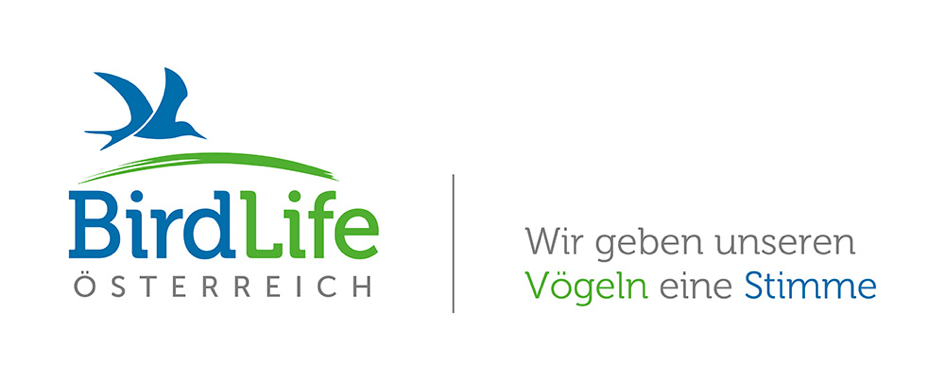

This project fulfilled version 1.1 of the quality criteria for citizen science projects on Österreich forscht.
Golden jackal
The golden jackal (Canis aureus) was not considered native in Austria, until the first golden jackal discovery was made in 1987, followed by sporadic records scattered over several federal states and in 2007 the first reproduction record was documented in the National Park "Neusiedler See-Seewinkel". Since then, rumours about camera trap pictures, fallow deer and one or two sightings have led to the assumption that these secretly living animals are present in some areas of Austria. In the context of the ongoing research project "The Golden Jackal in Austria", further evidence has been collected since October 2015. By means of acoustic stimulation in suitable habitats we carry out active monitoring and search for droppings and traces.
If you think you have seen a golden jackal or find a dog-like animal on your wild camera, please report your suspicion to us at: www.goldschakal.at, via the reporting form or by e-mail to the coordination and reporting office This email address is being protected from spambots. You need JavaScript enabled to view it..
The golden jackal project initiated the International World Jackal Day in 2023 and has since offered a webinar on interesting topics regarding the world of jackals every year on April 19th. Further Information can be found here: www.worldjackalday.com.
Information about the golden jackal
The golden jackal is a very elusive animal and lives very hidden, at a first and only fleeting glance, the distinction to fox or wolf is sometimes not so easy - but on closer inspection there are a few clear characteristics.
With a shoulder height of up to 50 cm, a body weight of 10-13 kg and a body length of about 100 cm the golden jackal belongs to the medium sized predatory game. This makes it larger and also longer-legged than the fox, but considerably smaller than the wolf. Recognisable features of the golden jackal are, among other things, the fused bales of the two middle toes and the rod which is rather short in relation to the body (with 20-30 cm). Its fur is yellowish-grey (to reddish), dark in the area of the back and the tip of the tail, and golden on the sides and legs. His brown face mask is marked by a white pattern around the muzzle and on the neck.
Golden jackals killed on roads can also be entered in the Roadkill project. Further information can be found on the project's YouTube channel.
Dr. Jennifer Hatlauf was a DOC-scholar of the Austrian Academy of Sciences. The Golden jackal project was supported by a bilateral "WTZ"- grant.
Newest publications
Custers J, Hatlauf J, van der Niet S, Tintoré B, Miliou A (2024), The
Secret Family Life of a Group of Golden Jackals on Samos, Greece. Ecol
Evol, 14: e70620.https://doi.org/10.1002/ece3.7062
Stefanović M, Bogdanowicz W, Adavoudi R, Martínez-Sosa F, Doan K, Flores-Manzanero A, Srinivas Y, Banea OC, Ćirović D, D'Amico G, Djan M, Giannatos G, Hatlauf J, Hayrapetyan V, Heltai M, Homel K, Hulva P, Ionică AM, Jhala YV, Juránková J, Kaboli M, Khosravi R, Kopaliani N, Kowalczyk R, Krofel M, Lanszki J, Lapini L, Lymberakis P, Männil P, Markov G, Mihalca AD, Miliou A, Modrý D, Molchan V, Ostrowski S, Pakeltytė G, Ruņģis DE, Šnjegota D, Szabó L, Tryfonopoulos GA, Tsingarska E, Volokh AM, Wójcik JM, Pilot M (2024) Range-wide phylogeography of the golden jackals (Canis aureus) reveals multiple sources of recent spatial expansion and admixture with dogs at the expansion front. Biological Conservation, 290, 110448. https://doi.org/10.1016/j.biocon.2024.110448
Böcker F, Weber H, Arnold J, Collet S, Hatlauf J (2023) Interspecific social interaction between golden jackal (Canis aureus) and red fox (Vulpes vulpes). Mamm Res (2024). https://doi.org/10.1007/s13364-024-00737-2
Suss L, Hatlauf J (2024) Focus on carnivore communities: photo traps and data analysis in biodiversity research. Acta Zoobot 160.
Image gallery
Click on image to enlarge.
-
 fox fox
fox fox -
 golden jackal golden jackal
golden jackal golden jackal -
 golden jackal brochure golden jackal brochure
golden jackal brochure golden jackal brochure -
 golden jackal golden jackal
golden jackal golden jackal -
 size comparison fox - golden jackal - wolf size comparison fox - golden jackal - wolf
size comparison fox - golden jackal - wolf size comparison fox - golden jackal - wolf -
 wolves wolves
wolves wolves -
 tracks of a golden jackal tracks of a golden jackal
tracks of a golden jackal tracks of a golden jackal
https://www.citizen-science.at/en/component/k2/author/934-florianheigl?start=130#sigProId9ffe3ea818
This project fulfils version 1.1 of the quality criteria for citizen science projects on Österreich forscht.
Pollen Diary
The Pollen Diary was launched back in 2009 as a scientific project as part of a master's thesis at the WU Vienna Executive Academy. Meanwhile it has become an important service for pollen allergy sufferers in 13 European countries: Austria, Germany, Switzerland, France, Great Britain, Sweden, Finland, Croatia, Hungary, Lithuania, Serbia, Slovenia and Turkey. The number of users is growing every year, not at least because of the projects that were made possible by the Pollen Diary, such as the pollen app, the exposure map and the personalized pollen information.
Users have the possibility to document their own allergic complaints (intensity and symptoms) together with their medication intake. This gives an overview of the pollen allergy and allows them to compare the symptoms with the measured pollen concentrations on a continuous basis as well as at the end of the stress phase of the allergy. In addition, it is possible to download an excel file with all entries. There, all data are summarized and additionally correlation calculations of pollen count and symptoms are provided. This is a first step towards the identification of the trigger. And even after the diagnosis by a specialist, the pollen diary is a valuable support for patients and medics to track the success of a therapy, the administration of medication or the course of the pollen allergy.
To make such a service possible in the first place, the Pollen Diary is linked to the European pollen database, and can therefore be used without any problems in all countries where it is already available. Special attention has been paid to easy handling as well as to compliance with the latest EU directives on data protection (more under the terms of use of the Pollen Diary).
Since 2013, the pollen diary can also be accessed via the "Pollen" app on Android and iOS. If a user documents complaints, a personalised pollen forecast is available free of charge, tailored to the personal reaction profile. Via the app, users can also get the stress forecast and other practical helpers for the everyday life of an allergy sufferer, which are offered free of charge on the homepage of the Austrian Pollen Warning Service.
Europe-wide pollen information is reached via this portal: www.polleninfo.org.
Image gallery
https://www.citizen-science.at/en/component/k2/author/934-florianheigl?start=130#sigProIdb081d519a9
This project fulfils version 1.1 of the quality criteria for citizen science projects on Österreich forscht.
Waterbird Census
Citizen Science with a long tradition
The first water bird counts in Austria took place as early as the 1950s. In the following years, the number of counts was gradually increased, and from 1970 onwards Austria-wide surveys have been carried out. This makes the waterbird census one of the longest running citizen science projects of BirdLife Austria. The censuses are carried out by volunteers between one and five times per winter (depending on the province) at defined river sections.
Decline in numbers
The aim of the waterbird census is to document the populations of waterbirds migrating through or overwintering in Austria, e.g. swans, ducks, geese or seagulls. In recent years, the majority of waterbird species have shown declining populations. Climate change is probably responsible for this – it leads to ever warmer winters and means that increasingly few waterfowl from northern and eastern Europe have to come as far south as Austria to find ice-free bodies of water for food.
Tasks and roles in the project
- Observer: In their free time they survey the birds according to the specified counting method. They regularly receive a summary of the results and the latest trend analyses.
- Federal state coordinators: They organise the censuses in the respective federal state. They are the first point of contact for the counters for questions and problems of any kind.
- Project management: data checking, data management, evaluations, reporting, lectures, contact person for questions of all kinds.
Participate
Further informationand results can be found on the website.
If you have any questions about the project or are interested in the collected data/results, please contact the project manager.
-
 Bird watching with binoculars Bird watching with binoculars
Bird watching with binoculars Bird watching with binoculars -
 Professional bird watching Professional bird watching
Professional bird watching Professional bird watching -
 Observation is more fun as a team! Observation is more fun as a team!
Observation is more fun as a team! Observation is more fun as a team!
https://www.citizen-science.at/en/component/k2/author/934-florianheigl?start=130#sigProIde5dbec0461
This project fulfils version 1.1 of the quality criteria for citizen science projects on Österreich forscht.
ornitho.at
Important groundwork for bird protection
The association BirdLife Austria has been researching and protecting the native avifauna for over 50 years. Citizen science has always been an essential basis of this work, as BirdLife's expertise is based on decades of collecting bird records. In the past, observations were recorded on paper slips, today www.ornitho.at is a modern and simple way to report bird observations.
Many functionalities
With the platform ornitho.at you can not only report observations of bird species, but also add photos or sound recordings of birds. Interested users can search the archive for photos, see current records of interesting bird species, get information about seasonal occurrence, manage all their own reports and much more. In addition, the observers can also be sure that their observations serve a good cause – namely the protection of the native bird world.
If you would like to record observations on the go, you can use the specially developed NaturaList app, which offers many smart functions:
Podcast episode
For the Österreich forscht podcast's first birthday, Christine Kovar, a dedicated Citizen Scientist in the project, gave interesting insights into the project in March 2023 - tune in! (in German)
Join in
Further information can be found here: www.ornitho.at.
-
 Bird watching with binoculars Bird watching with binoculars
Bird watching with binoculars Bird watching with binoculars -
 Professional bird watching Professional bird watching
Professional bird watching Professional bird watching -
 Observation is more fun as a team! Observation is more fun as a team!
Observation is more fun as a team! Observation is more fun as a team!
https://www.citizen-science.at/en/component/k2/author/934-florianheigl?start=130#sigProIde5dbec0461
This project fulfils version 1.1 of the quality criteria for citizen science projects on Österreich forscht.
Breeding bird monitoring
Annual counts
This advanced citizen science project requires knowledge of the common native breeding bird species and participation over several years. Twice a year, the participants count all birds seen and heard at fixed points. The total of all counts is then used to calculate population trends. The available data is currently sufficient to determine meaningful trends for about 90 bird species – from 1998 onwards. Sadly, the results show how important it is to monitor our breeding bird world: more than half of the species studied are declining in numbers, whereas only about one fifth of all species show an increase. The other bird species are currently stable.
Participate
Further information and results can be found on the website.
Tasks and roles in the project:
- Observers: In their free time they survey the birds according to the specified counting method. They regularly receive a summary of the results and the latest trend analyses.
- Federal state coordinators: They organise the censuses in the respective federal state. They are the first point of contact for the counters for questions and problems of any kind.
- Project management: data checking, data management, evaluations, reporting, lectures, point of contact for questions of all kinds.
If you have any questions about the project or are interested in the collected data/results, please contact the This email address is being protected from spambots. You need JavaScript enabled to view it..
Podcast episode
In June 2025, Norbert Teufelbauer was a guest on the Österreich forscht podcast Wissen macht Leute - you can listen to the episode here (in German).
-
 Bird watching with binoculars Bird watching with binoculars
Bird watching with binoculars Bird watching with binoculars -
 Professional bird watching Professional bird watching
Professional bird watching Professional bird watching -
 Observation is more fun as a team! Observation is more fun as a team!
Observation is more fun as a team! Observation is more fun as a team!
https://www.citizen-science.at/en/component/k2/author/934-florianheigl?start=130#sigProIde5dbec0461
This project fulfils version 1.1 of the quality criteria for citizen science projects on Österreich forscht.
Wild Neighbours
Are swallows nesting at your house or in your stable? Have you seen a badger in the middle of town? Or do you regularly observe a kestrel in your garden? We are interested in your observations in rural settlement areas!
Ural owl
Ural owl resettlement
The resettlement of the Ural owl is led by a team of researchers headed by ornithologist Richard Zink at the Austrian Ornithological Centre at "Vetmeduni" Vienna. The goal is the "Come Back" of the big owl into the forests of Austria. A new occurrence in the alps creates an essential link between the populations south (Slovenia, Italy) and north (Germany, Czech Republic) of the Alpine republic. Individual owls migrating between these populations ensure gene flow within the European metapopulation - the survival of the rare large owl can thus be ensured in the long term.
The designation of protected areas and the gradual conversion to sustainable forest management improved the living conditions for the Ural owls in Austria. Based on this, the project was requested by an international delegation of experts in autumn 2006. The Austrian release sites were selected for the protected areas "Wienerwald Biosphere Reserve" and the "Wilderness Dürrenstein", which offer the newcomers optimal survival conditions due to their ecologically particularly valuable forest stands. The project is based on the successful reintroduction that has taken place in the Bavarian Forest National Park (D) in the last century.
16 years after the first release of Ural owls in 2009, successes can already be recorded in the reintroduction project. The current population of Ural owls in the reintroduction area is estimated at about 50 territories. Since 2011, the reintroduced Ural Owls have also been breeding successfully in the open. The breeding success is subject to annual fluctuations, which are based on mouse gradations. Since then, at least 278 young Ural owls have been hatched in the wild and 545 released (as at end of 2024). You can report observations of Ural owls directly to the project team on our website.
Based on these successes, the focus of the project is now on increasing the genetic diversity of the Ural Owl population. This should ensure the long-term existence of the reintroduced population. Together with 25 breeding partners throughout Central Europe and around 50 breeding pairs, the project team is working towards this goal.
In order to give some assistance to the Ural owl, which does not build its own nests, approximately 550 nesting boxes have so far been installed in suitable forests in Eastern Austria with the help of a large number of landowners. You are a landowner with forest ground, you are enthusiastic about the Ural owl and would like to enable the installation of a nesting box? Or do you have time and want to support the project in spring by regularly checking one of our nesting boxes?
Get in contact with the project team - we look forward to meeting you!
https://www.citizen-science.at/en/component/k2/author/934-florianheigl?start=130#sigProId35c6525caf
This project fulfils version 1.1 of the quality criteria for citizen science projects on Österreich forscht.

